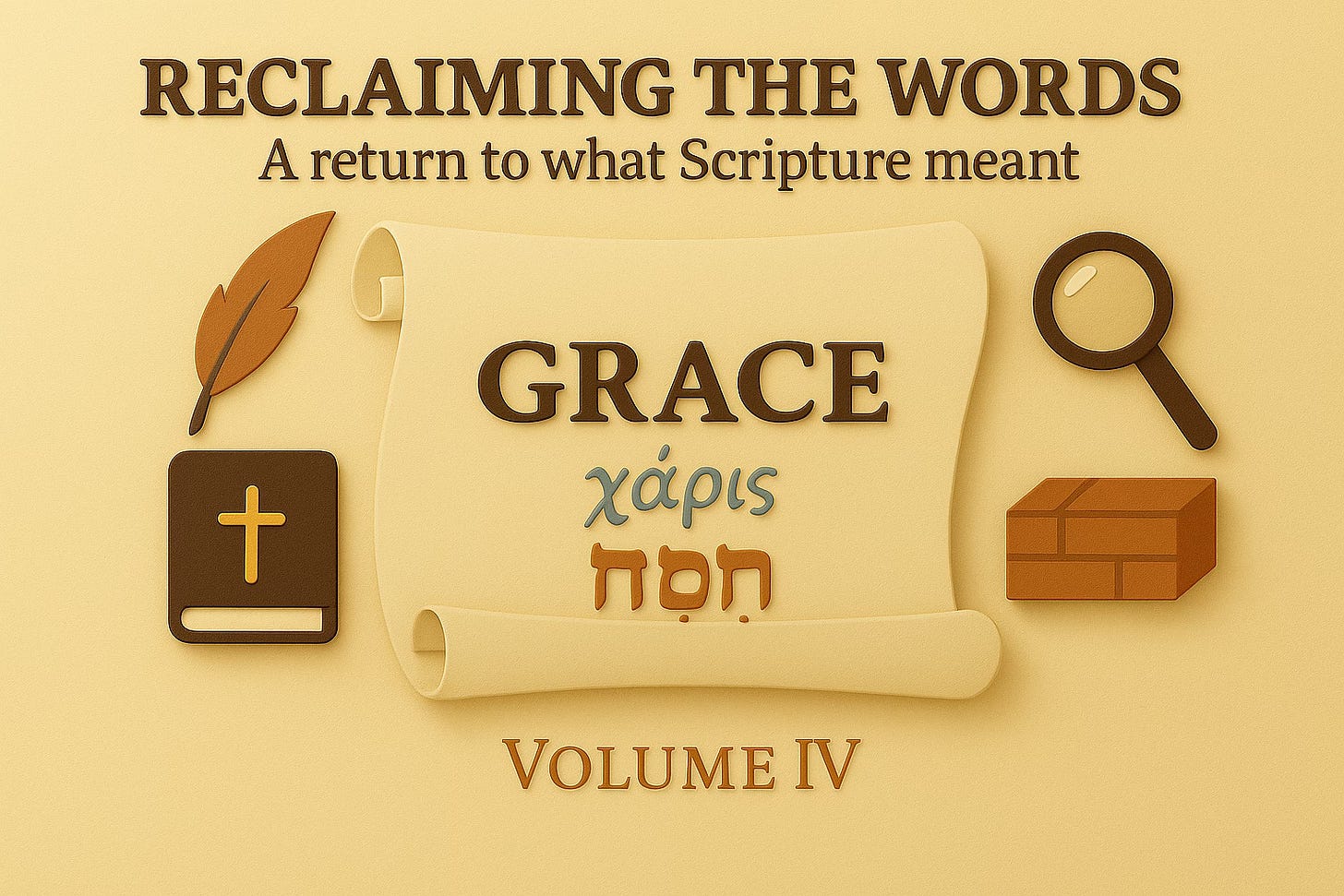Reclaiming the Words, Vol IV: Grace
What if “grace” isn’t just unmerited favor — but the empowering presence of God that transforms lives?
Reclaiming the Words, Vol II: Grace
What if “grace” isn’t just unmerited favor — but the empowering presence of God that transforms lives?
June 1, 2025
Series Introduction: Reclaiming the Words
In modern Christianity, words like grace, faith, church, gospel, and believe have drifted far from their biblical roots. Once rich with covenantal meaning, these terms have been softened by translation, diluted by tradition, or stripped of their Hebraic context. What once called people into lifelong loyalty now often invites momentary mental agreement.
This series — Reclaiming the Words — aims to restore their original depth. By returning to the Hebrew and Greek foundations — and the lived faith of the early ekklesia — we’ll rediscover how these sacred words shaped a people who truly walked in the Way of Life.
Understanding “Grace” in Scripture
Today, many define grace simply as “unmerited favor” — a free gift from God that we don’t deserve. While this definition isn’t wrong, it’s incomplete. Biblical grace is not just pardon — it is power. It is not merely God’s leniency but His life-giving presence that enables His people to live in holiness, humility, and love.
The Greek Word: Charis (χάρις)
In the New Testament, charis carries multiple meanings, including:
Favor or kindness
A freely given gift
The influence of God upon the heart
Divine empowerment
Paul writes:
“But by the grace of God I am what I am, and His grace toward me was not in vain. On the contrary, I worked harder than any of them — though it was not I, but the grace of God that is with me.”
(1 Corinthians 15:10)
The Hebrew Root: Chen (חֵן)
In the Tanakh, the word chen often appears as “favor” — especially when someone finds favor in God’s eyes. Yet when Yah gives chen, it’s not just approval — it leads to empowerment and covenant responsibility:
Noah found chen and built the ark.
Moses found chen and was called to deliver Israel.
Esther found chen and stood in the gap for her people.
Grace is not static. It's active — and it's missional.
Grace in the Words and Ministry of Yeshua
Yeshua didn’t use the word grace often — He embodied it.
In Luke 4:22, His hometown marveled at the “gracious words” (logoi tēs charitos) from His lips — words that both comforted and convicted.
When He forgave sinners and healed the outcast, He extended charis — favor that transformed lives.
In John 1:14–16, we learn that He is “full of grace and truth,” and from His fullness we have all received “grace upon grace.”
He did not lower the standard of righteousness. He empowered people to rise into it.
Paul and the Power of Grace
To Paul, grace is the engine of the covenant life:
Salvation by grace — Ephesians 2:8
Training in righteousness — Titus 2:11–12
Sustaining through trials — 2 Corinthians 12:9
It’s not just about forgiveness. It’s about being equipped to live as Yeshua did.
Why the English Falls Short
In English, grace is often thought of as “not getting what you deserve.” In Hebrew and Greek thought, grace is much more:
The favor of God
The power of God
The presence of God
The call to respond
Practical Application:
Live by the Grace You’ve Been Given
Don’t treat grace as a permission slip — treat it as a power source.
This week, identify one area of your life where you’ve felt weak, stuck, or unworthy — then invite the empowering grace of Yah to transform it.
Are you struggling with fear? Ask for the grace to walk in courage.
Have you been distant in prayer? Ask for the grace to draw near.
Is there someone you need to forgive? Ask for grace to love as you’ve been loved.
Grace is not only for when we fail — it's the power to overcome.
Discussion Questions:
How has your understanding of “grace” changed after exploring its Hebrew and Greek roots?
Why do you think Yeshua embodied grace more than He talked about it?
Can grace be resisted or received in vain (see 1 Cor 15:10)? What does that mean for how we live?
In what ways have you treated grace as license rather than power?
What’s one area of your life where you want to invite Yah’s empowering grace to make a change?


